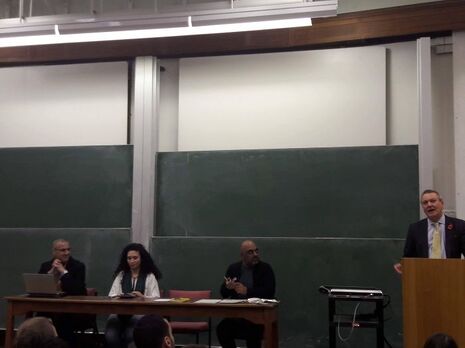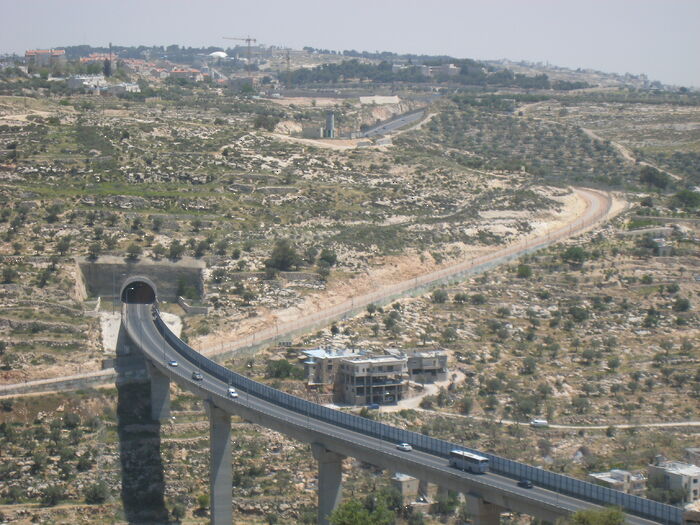PalSoc panel goes ahead after ‘aggressive’ Uni intervention
After the University stepped in to replace the event’s planned chair, one audience member had to be forcibly removed during the discussion

On Wednesday evening, University staff and students gathered to discuss the current situation of the Israeli-Palestine conflict, after the University replaced the event’s chair with their own director of communications.
The panel discussion, entitled ‘BDS [the boycott, divestment and and sanctions movement against Israel] and the Globalised Struggle for Palestinian Rights’ was co-hosted by Cambridge University Palestine Society and the Cambridge University Middle East Society.
The panel comprised Omar Barghouti, co-founder of the BDS movement, Malia Bouattia, former NUS president, and Asad Rehman, executive director of anti-poverty charity War on Want. The discussion was chaired by Paul Mylrea, the University’s director of communications.
Mylrea was installed as chair by the University, after their objections to plans to invite Dr Ruba Salih, an academic from SOAS, to chair the panel.
During the panel event, Barghouti discussed the goals of BDS and its concern with ending the “settler colonialism” and “apartheid” which he believed had been imposed by Israel on the Palestinian people. Bouattia followed with a discussion of the role of students and suggested that pro-Palestine activism “laid the foundation for a re-politicisation of the student movement as a whole”.
Priti Patel, the former Secretary of State of State for International Development, also drew debate. Bouattia emphasised the importance of interrogating the “ideological perspectives” driving government policy and suggested that attempts to “depoliticise” activist movements should be viewed with suspicion.
The speeches were disrupted by the Chair’s repeated calls for “respectful debate” in response to a protestor displaying signs in the front row. The protestor, who asserted his right to “silent protest”, was eventually escorted out of the lecture theatre by security. As he left, he held up a large Israeli flag and said to the audience that they were “being told a pack of lies”. His departure was greeted by applause and cheers.
Both Bouattia and Rehman gave statements condemning Dr. Salih’s dismissal. In a statement read out at the event, Boutattia expressed her “deep concern over the attempts of censorship and the undermining of academic freedom”, adding that it was important to stand in solidarity as “we continue to take on the white supremacist tendencies of the academy and our institutions through their so-called attempts at enforcing so-called neutrality”.
Speaking to Varsity after the event, Rehman said, “It is absolutely reprehensible that a woman of colour Muslim academic has been removed in this manner’. He added that it was an “abuse of university power” and that such interference should be of “serious concern to students”.
In response to Mylrea’s appointment, the Palestine Society published an open letter that has already accumulated over 350 signatures, that criticises the University’s alleged “threat to academic freedom”. The letter accuses the University of “aggressive institutional intervention”, and of having supported “those who seek to silence the voices of the marginalised”.
When contacted by Varsity for comment, a University spokesperson said: “The University is fully committed to freedom of speech and expression. We do understand that certain events and issues invoke strong feelings among people and communities. But we believe it is important that staff, students and visitors to the University can participate fully in legitimate debate”. They added that Mylrea had been appointed following “calls from the organisers for extra safety measures”.
On Thursday, CUSU President Daisy Eyre released a statement on social media, which read: “Last night, I was shaken by the implications of the University’s decision to request an ‘independent’ chair on the panel event ‘BDS and the Globalised Struggle for Palestinian Human Rights’.
“The University needs to think hard about whose voices it is privileging and whose it is silencing when it interferes in events like this. The University very rarely takes a hand in student events and here, it has decided that a particular set of views are to be treated differently from others.
“This is certainly an instance of the insidious power of Prevent legislation, and an example of an uneven use of University interference.”
Eyre said she had emailed key figures within the University and asked to meet and discuss changes to procedure. Her statement also urged students to “sign this letter condemning the action by the University, so that they can see that the choice they have made is not practical or pragmatic but an exercise of power against marginalised groups”
 News / Judge Business School advisor resigns over Epstein and Andrew links18 February 2026
News / Judge Business School advisor resigns over Epstein and Andrew links18 February 2026 News / Gov grants £36m to Cambridge supercomputer17 February 2026
News / Gov grants £36m to Cambridge supercomputer17 February 2026 News / CUCA members attend Reform rally in London20 February 2026
News / CUCA members attend Reform rally in London20 February 2026 News / Union speakers condemn ‘hateful’ Katie Hopkins speech14 February 2026
News / Union speakers condemn ‘hateful’ Katie Hopkins speech14 February 2026 News / Hundreds of Cambridge academics demand vote on fate of vet course20 February 2026
News / Hundreds of Cambridge academics demand vote on fate of vet course20 February 2026










